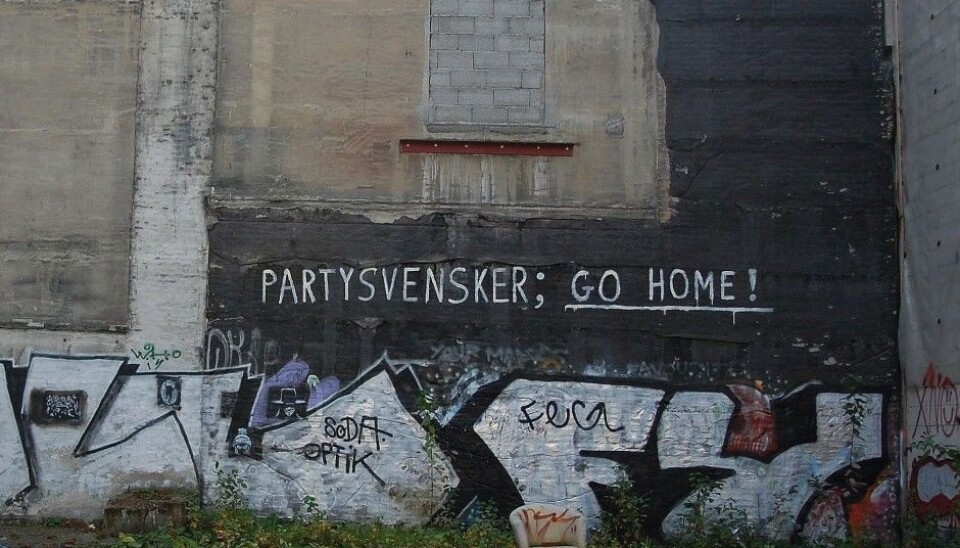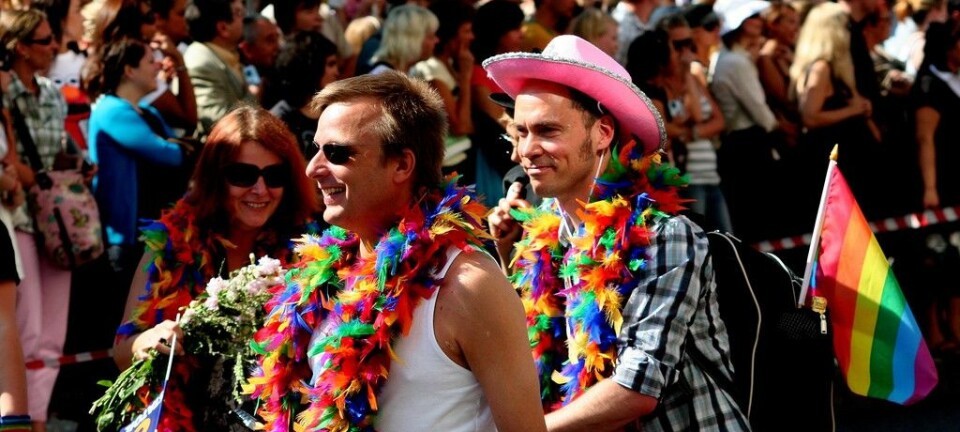
Swedes in Oslo are tired of negative stereotypes
Young Swedes in Oslo laugh at Swedish jokes in the beginning. But it's not so funny after a few years.
Denne artikkelen er over ti år gammel og kan inneholde utdatert informasjon.
When someone painted “Party Swedes; go home” on a wall in Oslo in 2008, life for young Swedish migrant workers in Norway’s capital city changed a little bit, and not necessarily for the better.
An estimated 55 000 Swedes have crossed the border to work in Norway. They come to take advantage of higher wages and lower unemployment, but the transition is not always easy.
That might seem surprising to the outside world, which has its own monolithic stereotype of the Scandinavian countries as being uniformly populated by happy, blonde-haired people who have a strong social welfare network and some of the highest living standards in the world.
But when Ida Tolgensbakk from the University of Oslo interviewed some of these young migrant Swedes in Norway, she found a surprising range of reactions to their situation in Norway.
Racist
Tolgensbakk studied the experience of young immigrant Swedish workers in Oslo for her doctoral dissertation. Their numbers have made the Swedish the second largest immigrant group in Norway, behind the Poles.

These immigrants typically work in the service industry, and often earn better wages than in Sweden. Much like other young people their age, they spend some of their wages on Oslo’s nightlife – and they may party very hard.
As a result, Norwegians have coined the phrase “party Swedes”, used in a derogatory way to describe migrant Swedes as party animals who drink heavily and live in crowded collectives. The Norwegian rappers Jaa9 & OnklP helped spread the phrase nationwide with their song “Party Swedish”, which has a catchy refrain that describes the Swedes with a blunt obscenity.
“Party Swedish” is just one of the many words that are used in a derogatory way against the Swedes.
The researcher believes that this kind of labelling reflects racist feelings that Norwegians have towards the Swedes.

“Although it is not as strong as the racism towards other immigrant groups – for example, the Swedes are not excluded from the labour market – there are clear prejudices about the Swedes,” says Tolgensbakk.
Not racist
Researcher Jon Horgen Friberg at Fafo, a research institute in Oslo founded by a trade union that studies changes in living and working conditions, says racism is too strong a word to describe what Swedes experience in Norway.
“I think that is stretching the concept of racism too far,” he said. Friberg has not read Tolgensbakk’s dissertation.
“Young Swedes in Norway can certainly be exposed to negative prejudices about being party Swedes. But as I understand racism, it presupposes a perception that one group is worth less than another. I do not think that is true of Norwegian attitudes about Swedes in general,” says Friberg.
Norway’s relationship with Sweden
It seems to be acceptable in Norway to give Swedish immigrant labourers a hard time.

“Norwegians liked the ‘Party Swedish’ song. The graffiti was left unaltered, despite the clear anti-immigrant phrase ‘go home.’ This would have never been accepted if it was written about Pakistanis, for example,” said Tolgensbakk.
She believes the petty meanness says something about the relationship between Norway and Sweden.
Norway is a small country compared to its big brother in the east, which may have led to a general acceptance of Swedish jokes. The jokes can be seen as a compliment, in that Norwegians are not afraid to joke because they see themselves on equal footing with the Swedes. In that context “Party Swedish - go home” can be seen as humorous.
Tolgensbakk says, however, that the label bothers some Swedes.
Laughing it off
There is power in mockery - the power to define the other, Tolgensbakk says.
The twenty-one Swedes she interviewed for her dissertation were quite unprepared for what they encountered in Norway.
They knew little about the country and about Norwegians, and had no idea that Norwegians were so eager to make fun of them.
Most often they perceive the nickname “party Swedish” as a benign joke. “It’s only said in fun,” said several Swedes that Tolgensbakk interviewed.
Some think the moniker is fun and even use it themselves – much in the way that gay men transformed the word “gay” to mean something positive. Norway’s young Swedes call each other party Swedes when they invite people to parties on the Facebook group “Swedes in Oslo,” which Tolgensbakk also studied. She has looked at posts from approximately 1,000 participants.
At the same time “party Swedish” can be said in an aggressive way by Norwegians, who might use it as an insult after a drunken night on the town, along with “Swedish bastard.”
Silent protest
The Swedes handle jokes or bullying by their Norwegian counterparts in different ways. Many dismiss the whole thing as a trifle. Some Swedes say the bullying comes from Norwegian men who feel threatened by competition for Norwegian women.
It is difficult to respond to humour without being perceived as humourless. A common strategy is thus to turn the joke around. At some point someone wrote under the “go home-graffiti”: “But isn’t Norway actually Swedish??!”, which was probably a reference to the nearly 100 years that Norway was in a union with Sweden.
Swedes are sought-after labour migrants in Norway, but the Swedes feel that Norwegians see them as being different. Although they do not protest very loudly in public, many are tired of having their “otherness” constantly pointed out.
“After a few years it’s no longer fun to be called “party Swedish”. It is experienced as mean,” says Tolgensbakk.
Reference:
Ida Tolgensbakk: Partysvensker; GO HARD! En narratologisk studie av unge svenske arbeidsmigranters nærvær i Oslo. (Party Swedes; GO HARD! A narratological study of young Swedish labor migrants in Oslo). Doctoral dissertation, Department of Culture Studies and Oriental Languages, University of Oslo, 2014.
——————————————————
Read the Norwegian version of this article at forskning.no



































